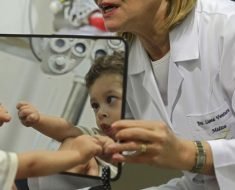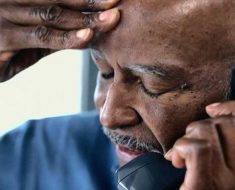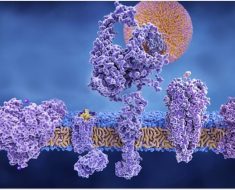
In the Dutch coastal town of Urk, many people are still raised with a few core beliefs: God, fishing and refusing to be vaccinated.
Located in the conservative Protestant “Bible Belt” of the Netherlands, Urk suffered a measles outbreak in June because of low vaccination rates.
But as the World Health Organization warns of a measles surge across Europe, there are hopes that Urk can show how to turn things around.
“At this point vaccination is 60 percent and that’s low compared with the rest of the country. We are the second-lowest in the Netherlands,” Freek Brouwer, the Urk town councillor for health told AFP at his office.
Like other Bible Belt towns, Urk is part of the Dutch Orthodox Reformed Church, and religion plays a strong part in daily life, alongside its traditional mainstay fishing industry.
Ninety-four percent of people in Urk regularly go to church, which has traditionally opposed television, movies—and vaccination.
“It’s the idea that you cannot do it because it is God who will take care of us—it’s also the same with insurance,” says Brouwer, a member of the Dutch Christian Democratic party, who is also a board member of the provincial public health service.
But these days religion is less of a factor than it used to be when it comes to vaccines, he says.
“Previously it had a lot to do with deeply religious motives, and I respect that. Now we see it has much more to do with habit—’Mom and dad did not vaccinate, so why should I’?”
“The reverends and the preachers from the churches that are against it, they don’t preach it, they leave it to the people themselves.”
‘God is in charge’
Urk is only 80 kilometres (50 miles) from Amsterdam but culturally it is far more distant from the liberal capital, where prostitution is legal and cannabis is sold openly.
Seventy years ago Urk was still an island, before being joined to the Dutch mainland by a huge land reclamation project. It retains its own dialect, and much of its isolated mentality.
On a busy market day by the harbour, many Urk residents insisted religion was still the reason some people opposed immunisation.
“My children have been vaccinated. But I think it’s a personal thing for everybody,” said Yvonne Verbaan, 44.
“But also, last week I read about a young boy who was also vaccinated but suffered an epileptic fit afterwards and had brain damage because of it. That does make you think whether it is a good thing.”
Shopping with her two sons, Jacoba Zoer, 37, agreed that “vaccination is a good thing and I have had my kids vaccinated.”
Asked why people don’t vaccinate on Urk, she replied: “People’s religion is against it. They say God is in charge and ‘He will save me when I get ill’. I also think it (vaccination) is more controversial, not only on Urk.”
The Dutch National Institute for Public Health and the Environment recorded 42 cases of measles in the Netherlands in 2019 so far—compared with 24 in all of 2018.
A measles outbreak in 2013-14 hit the Dutch Bible Belt, killing one child, hospitalising 182 children, and officially affecting 2,700 others, though officials said the actual number was much higher because many did not go to the doctor.
‘Lot of fake news’
Councillor Brouwer meanwhile also blamed the internet for spreading ‘anti-vaxxer’ ideas.
“What we also see is that people are thinking ‘this is poison, it is going to cause autism’—a lot of fake news,” he said.
When nine children and one adult came down with measles in June, he said it was a “positive surprise” that many people came for free vaccinations offered by the government.
“But there were also people I know whose children got measles and didn’t go to the doctor—they said ‘it’s over in one or two weeks and they’re not sick any more’, so the number must be a little bit bigger.”
Brouwer rejected the idea of making measles vaccination compulsory, as Germany has done, saying the goal was to better inform parents.
“People have to make their own choices based on the correct information—something like that must never be forced because people will resist,” he said.
In Urk, doctors are advising pregnant women, local authorities have held information evenings for parents, and they have distributed a newsletter with interviews left disabled by polio before the government introduced vaccinations.
Source: Read Full Article





